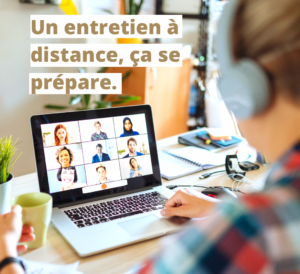Welcome to our blog
DISCOVER THE WORLD OF TALENT ACQUISITION

2020 has been a real
springboard for companies to adapt, particularly when it comes to recruitment.
Human resources departments have had to, and still have to, manage the crisis
within their establishments: making sure that employees don’t give up on teleworking,
adapting to new regulations on salaries, continuing to recruit… In fact, on
this last point, we can raise a real issue: how do you organise a recruitment
campaign and take on a candidate without even meeting them? The solution was
quickly put in place, and even if it doesn’t appeal to everyone, it has a
number of advantages, all the more so in this particular context.
Videoconferencing has enabled recruiters to meet candidates virtually, and
without masks! Perhaps you’ve been through this stage recently, or not yet, but
whatever the case, we’re going to give you some tips on how to make a success
of your remote interviews.
Use the right
equipment!
The first key to a
successful remote interview is the equipment you use. In a face-to-face
environment, this is not an issue, which is why you need to pay particular
attention to it: neglecting one detail could mean wasting time or ruining an
interview. That’s why we advise you to make sure that your microphone is
effective, because without the voice, nothing can be achieved.
Secondly, you have
the chance to present yourself to your candidate without a mask and vice versa,
so check your camera. Facial expressions are extremely important and you should
take the opportunity to show them when you can.
Finally, be sure of
your link because, as you know, this virtual element will be your office for a
few moments. If it doesn’t work for any reason, you’re going to lose time and
be forced to find an immediate solution. As a result, you won’t get your
interview off to a good start, if at all!
Don’t neglect the
appointment time.
A word of advice:
don’t rely on connection problems! It has been proven that we are more relaxed
when we work from home, or at least from a distance. The fact of not meeting
someone in person sometimes removes the notion of punctuality and this is very
unpleasant for the person with whom you have an appointment. If you schedule an
interview by videoconference, and if you agree on a time with your candidate,
it’s not to keep them waiting for 15 minutes. You may have your children at
home, but when you work in an office, there are the hazards of the road! So
it’s important to plan ahead before the interview to make sure you’re on time
and don’t have any problems when the time comes. It’s also about respecting the
candidate, who is waiting alone in front of his or her screen.
Choose a place where
you can be sure of not being disturbed
Interviews at a
distance are no mean feat when you’re living with several people. However,
noise, people passing by or even being in the same room as someone else are all
distracting factors that can disturb not only you, but also your candidate.
Five seconds of attention given to your surroundings is thirty seconds of
inattention given to your candidate. It’s simple, your brain is drawn elsewhere
and you then have time to think, then time to concentrate.
By taking precautions
in this respect, you maximise the chances of a successful interview: it will
not be interrupted by anything external, so you will be fully concentrated from
start to finish.
Put the candidate at
ease.
Interviewing from a
distance is an unusual process which, for some candidates, is a real advantage
and not at all for others. Even if you are face to face with the person, a
screen separates you, sometimes a time difference and sometimes thousands of
kilometres. Whatever the case, we advise you to put the candidate at ease from
the outset so that the interview goes as smoothly as possible and is as
pleasant as possible for both, or several, parties. For example, you can start
the call by asking if the person can hear you well, if they can see you well or
if they have had any problems connecting. This will also give you an idea of
how well you’ve prepared for your appointment. You can also ask them if they
are not too apprehensive about the fact that this moment is taking place around
a screen, and possibly reassure them. It will take you just a few minutes to
establish a climate of trust, so seize the opportunity!
Don’t skip the
debriefing stage – it’s even more important!
Finally, one of the
most important stages of the interview is how it ends. Once the interview is
over, it’s in your interest to talk to the candidate for a few minutes to find
out how they feel, and perhaps to get to grips with some of their less professional
personality traits. You will certainly learn from the way you conducted the
interview, but also from the impressions the candidate may have had. Whether
the interview went well or badly, we recommend that you at least try to debrief
– you’ll come out all the better for it!


